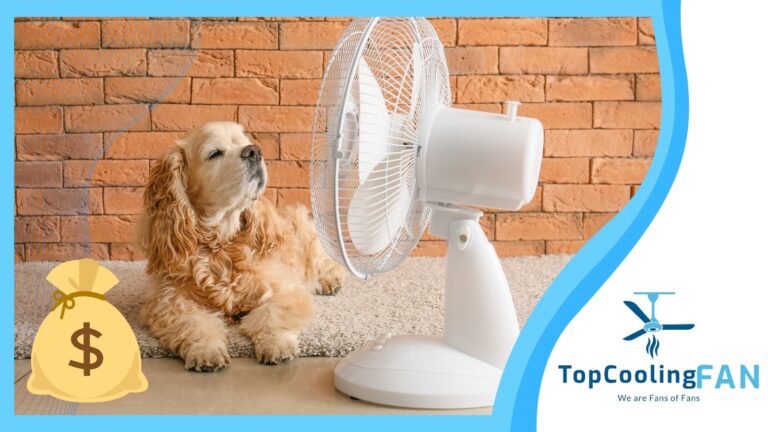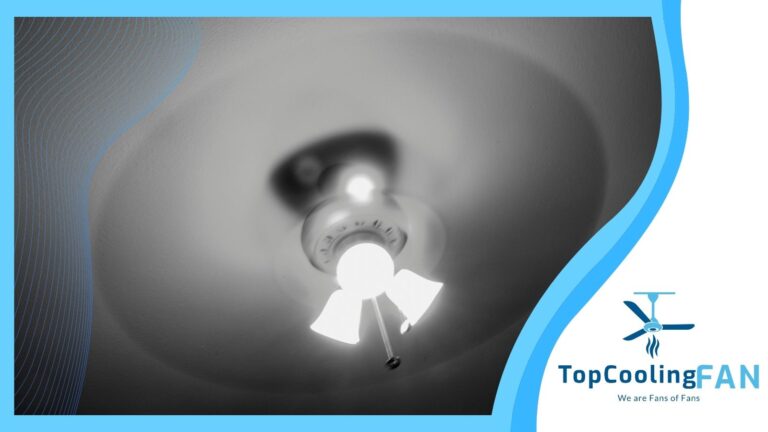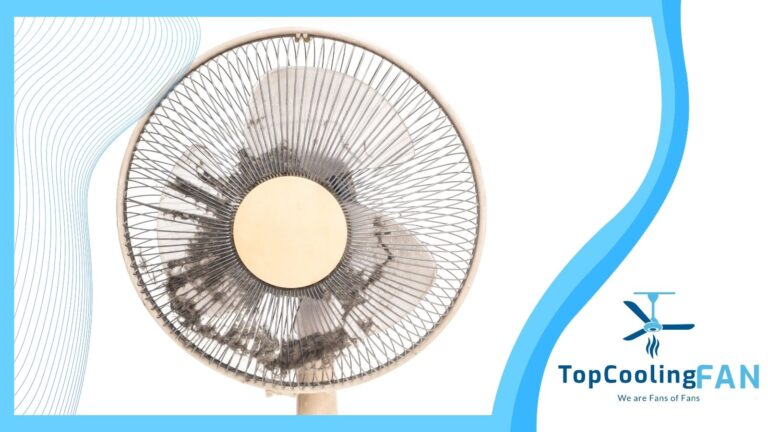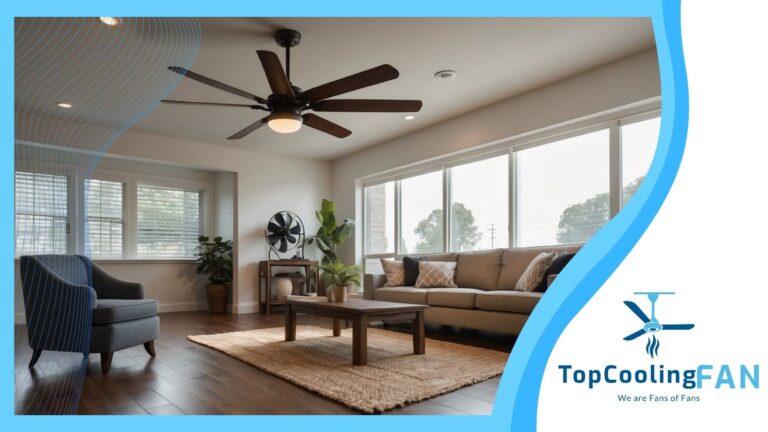Sleeping With a Fan On: Pros and Cons for Comfortable Slumber
Many individuals find the idea of sleeping with a fan on to be a comforting one. In warmer climates or during hot summer nights, it provides a gentle breeze that can not only reduce the discomfort of heat, but also create a background white noise which some people find soothing.
As the fan circulates air, it can improve the ventilation of the room. This makes it feel fresher and less stuffy, which for many is conducive to a good night’s rest.

However, the use of a fan during sleep isn’t without its potential drawbacks. While the cooling and airflow benefits are clear, the constant circulation of air can also have less desirable effects, particularly for those with allergies or asthma.
The fan can stir up dust and pollen, which can disrupt sleep by triggering respiratory or skin reactions. For some, a fan may also cause the air to become too dry, which can lead to irritation in the eyes, throat, and skin, or exacerbate existing respiratory conditions.
To optimize the bedroom environment for restful sleep, weighing the pros and cons of sleeping with a fan on becomes an essential consideration. It ultimately depends on personal preferences and health conditions, as well as external factors like room temperature and humidity levels.
Health Benefits of Sleeping With a Fan On
Many individuals find that sleeping with a fan on enhances their sleep experience. This may be due to various benefits such as improved air circulation, alleviating allergy symptoms, and the soothing influence of white noise.
Improved Air Circulation
Good air circulation is essential for maintaining a comfortable sleep environment. A fan helps to circulate air throughout the room, preventing the buildup of heat and ensuring a cooler sleeping area.
This can be especially beneficial for individuals who tend to overheat during the night or live in warmer climates.
Reduction in Allergies and Congestion
Having a fan on can also help reduce the presence of allergens such as dust and pollen by keeping the air in motion. This can be particularly helpful for those with allergies or asthma, as it may reduce congestion and improve respiratory comfort while sleeping.
White Noise Effects on Sleep
The constant sound produced by a fan is often referred to as white noise. This type of sound can mask disruptive background noises that may interfere with one’s ability to fall asleep or stay asleep. The hum of a fan can be a soothing backdrop for those seeking better sleep.
Potential Risks and Side Effects

When talking about using a fan while sleeping, it’s essential to be aware of certain risks such as dryness and dehydration, respiratory irritation, and challenges in maintaining an optimal temperature.
Dryness and Dehydration
Using a fan overnight can cause dry air to circulate around the room, which may lead to dehydration. The constant airflow can dry out the skin and mucous membranes, potentially resulting in dry eyes and dry skin.
For those who breathe through their mouths during sleep, a fan might exacerbate a sore throat due to airway dehydration.
Respiratory Irritation
The circulation of air by a fan can unfortunately pick up and spread allergens and dust, which may cause respiratory issues for some individuals. Those with allergies, asthma, or sinus problems might experience aggravated symptoms like coughing or a stuffy nose, due to the fan’s airflow disturbing airborne particles.
Cooling Challenges
While a fan helps to cool the body by evaporating sweat and reducing body heat, it can sometimes make it difficult to maintain a consistent temperature throughout the night. For individuals sensitive to cold, a fan might cool them too much, leading to interrupted sleep.
Moreover, fans don’t cool the air but only move it around, so they might be less effective during extremely hot conditions.
Practical Considerations for Fan Use

When considering the use of a fan for sleep, one must take into account not just the type and placement, but also how it fits into overall sleep hygiene practices and the timing of its use to ensure a restful night.
Proper Placement and Types of Fans
For optimal benefit, a ceiling fan should be positioned directly over the bed to provide even air circulation. However, a floor fan or portable fan might be more beneficial if targeted airflow is needed.
It’s crucial to ensure fans are placed in a manner that doesn’t disrupt sleep by blowing air directly faced to avoid drying out mucous membranes or causing discomfort.
- Ceiling fans: Circulate air overhead, can cause less disruption.
- Floor and portable fans: Offer directional airflow, customization.
Integration With Sleep Hygiene
Integrating fan use into one’s sleep hygiene regimen is essential. A fan generates white noise that helps mask other disruptive sounds. However, some may find the noise of a fan disturbing.
In such cases, one might consider alternatives such as white noise machines or earplugs.
The bedroom environment should be one that promotes sleep, and maintaining a cool, comfortable, and quiet environment is paramount.
- Sleep hygiene practices: Include a cool and quiet bedroom environment.
- Alternative solutions: Consider white noise machines if fan noise is disruptive.
Timing and Duration of Use
Utilizing a timer can optimize sleep conditions by ensuring that the fan runs only as long as necessary to maintain comfort. This also assists in conserving energy and minimizing noise throughout the night, which might disrupt sleep.
- Setting a timer: Coordinates with sleep cycle, conserves energy.
- Duration of use: Limits overcooling and continuous noise that may disturb sleep.
Comparison With Alternatives

When considering how to stay comfortable during sleep, it’s important to examine the effectiveness, cost, and health implications of various options such as air conditioning, humidifiers, and other sleep enhancements compared to using a fan.
Air Conditioning vs. Fans
Air conditioning provides a comprehensive cooling solution by reducing the indoor temperature and controlling humidity. However, air conditioning systems can significantly increase energy bills and may not be environmentally friendly.
On the other hand, fans, including cooling fans, are more energy-efficient and cost-effective. They offer a cooling breeze but can struggle during extreme heat. Fans are preferable for mild to moderate climates or when the cost is a major consideration.
Humidifiers and Air Filters
While fans circulate air, they do not improve air quality or humidity. In contrast, humidifiers add moisture to the air, which can be beneficial in dry climates and for individuals with respiratory issues.
Air filters or purifiers can remove allergens and dust from the air, promoting better breathing during sleep. Neither directly cool the air, but they can complement fans by creating a more comfortable sleep environment through improved air quality.
Other Sleep Environment Enhancements
For sleepers looking for alternative ways to improve their sleeping conditions without relying on traditional means, various options are available:
- Cooling mattresses and cooling sheets provide a surface that dissipates heat and helps regulate body temperature throughout the night.
- Sleep medicine should be approached with caution and professional consultation, as it generally addresses sleep disorders rather than temperature discomfort.
- A cooling pillow can add an extra level of comfort by drawing heat away from the head and neck.
- Blackout curtains can prevent heat from entering the room during the day, resulting in a cooler room by bedtime.
Management of Sleeping Conditions

Creating optimal sleeping conditions involves managing noise, temperature, and adapting to different seasons. Each factor plays a significant role in ensuring a restful night.
Addressing Noise Concerns
Noise can greatly disturb sleep, but using a fan may provide a dual solution—circulating air and generating white noise to drown out disruptions.
For those sensitive to sound, options like earplugs or noise-cancelling devices can be considered. Moreover, a steady hum from a fan might soothe sleepers into a deeper slumber.
Controlling Bedroom Temperature
Maintaining a comfortable temperature in the bedroom is crucial. During warmer months, sleeping with a fan on can facilitate airflow and cool down the space, potentially preventing sleep disturbances such as night sweats or sore muscles.
However, it’s important to avoid direct airflow on the skin all night to prevent dryness of skin and eyes. Using breathable bedding also aids in temperature regulation.
Dealing With Seasonal Changes
As seasons change, so do sleeping needs. People might find keeping their window open for fresh air beneficial, yet it’s important they balance this with maintaining a comfortable temperature and managing potential allergy symptoms.
During menopause, hot flashes can make sleep tricky. A fan can help, but managing bedroom temperature through layering bedding and taking a bath before bed might also ease discomfort.
Understanding Individual Needs
When considering sleeping with a fan on, it’s important to recognize that the decision should be tailored to individual needs. Take into account health conditions, age, and sensitivities.
Effects on Snoring and Sleep Apnea
For individuals who snore or have sleep apnea, a fan might reduce snoring by keeping air circulating, potentially decreasing nasal congestion. However, it could also dry out the throat, which might aggravate these conditions, leading to a sore throat or increased apnea events.
Influence on Children and Elderly
Children and the elderly can be more susceptible to environmental irritants. While a fan may provide comfort, it could also facilitate allergic reactions or lead to a stiff neck if air is directly blowing on them.
Moreover, the fan’s airflow could increase the risk of excess mucus production or nosebleeds, especially in a dry environment.
Impact on Individuals With Health Conditions
People with specific health conditions should be cautious. A fan can potentially worsen symptoms of those with sinus headaches or respiratory problems by circulating allergens.
Conversely, a gentle breeze may alleviate congestion for some but might lead to sinus irritation or dry eyes in others.
Maintenance and Care of Fans

Ensuring that your fan operates effectively involves regular maintenance and careful cleaning.
One should not only consider the immediate comfort that a fan provides but also the long-term benefits of maintaining a clean and efficient appliance.
Here are some specific guidelines to keep your fan in top condition.
Regular Cleaning Procedures
Proper hygiene dictates that fans should be cleaned regularly to prevent the build-up of dust and allergens, which could be harmful to individuals with sensitivities such as dust mite allergies.
To clean your fan correctly, unplugging the unit is the first step for safety.
Use a soft cloth or brush attachment on your vacuum cleaner to remove dust from the blades and exterior surface. For deeper cleaning, a damp cloth can wipe away more stubborn grime.
If the fan has a removable grill, one can detach it to clean the blades more thoroughly.
After cleaning, ensure the fan is completely dry before reconnecting to power.
Weekly procedure:
- Power off and unplug fan
- Wipe all accessible parts with a dust-repellent cloth
- Use a vacuum cleaner with a brush attachment on the grill and blades
- For washable filters, if present, follow the manufacturer’s cleaning instructions
Monthly check:
- Inspect for any damage on cord or unit
- Confirm that screws are tight to prevent wobbling
- Ensure no unusual noises are present during operation
Ensuring Optimal Performance
Regular maintenance doesn’t only concern hygiene; it also plays a crucial role in a fan’s performance and longevity.
Inspecting your fan for potential operational issues is integral to maintaining its condition. Replace any worn-out parts promptly.
Check the fan’s manual for specifics on lubrication to ensure smooth function without noise or hitches.
Conclusion

The decision whether to sleep with a fan on is nuanced and varies based on individual comfort and health considerations.
A fan offers temperature control and can produce a calming white noise that may benefit sleep. However, it also has potential drawbacks. For those suffering from allergies, the fan’s air circulation could exacerbate issues by spreading allergens.
Health aspects should be a priority when making this choice. If one experiences dryness of skin or eyes, or has respiratory issues, it might be advisable to rethink this habit or implement remedies like a humidifier.
Conversely, for those who find a fan essential for comfort, using air filters can help mitigate some concerns.
Using fans with built-in timers might be a compromise, combining the benefits of a cooler environment to fall asleep with a reduction in possible negative effects from prolonged use. This approach can also be more energy efficient.
In summary, the nightly use of a fan is subject to personal health needs and preferences. One should weigh the benefits of comfort and cooling against the risks of allergen circulation and dryness. Adopting strategies such as timers and air purifiers can help customize the environment for a restful night while addressing possible health concerns.






